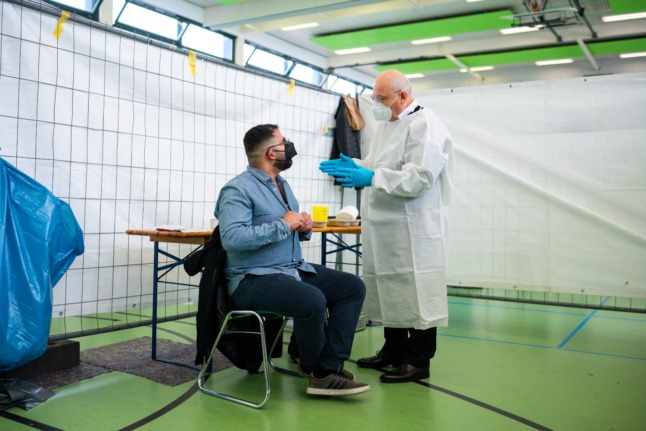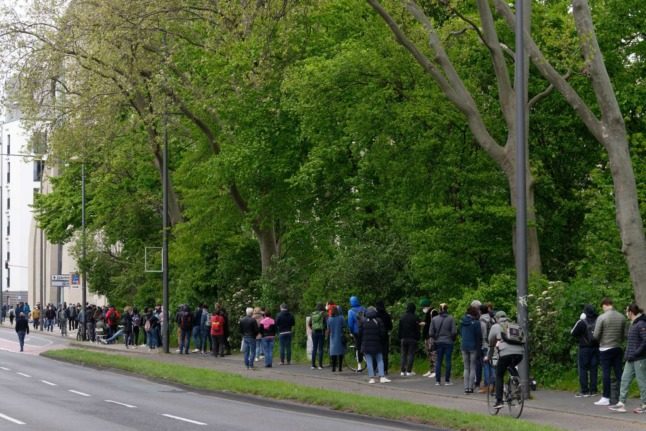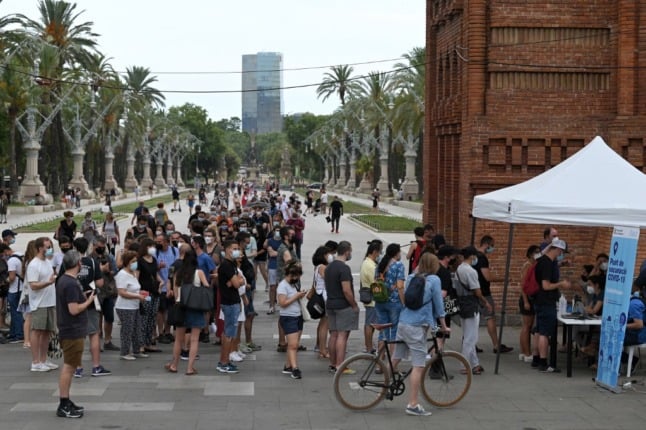After a painfully slow start, Germany ramped up its vaccination campaign, breaking European records on the number of shots administered to people in one day.
Yet despite all of this, there appears to be a lottery on where things are moving quicker in the country.
Now as Germany gets ready to lift the priority list on June 7th – meaning that all adults will be able to apply for a vaccine appointment, no matter their age, health condition or job – there are worries that not all members of risk groups are being vaccinated.
Although Dortmund, in North Rhine-Westphalia, has opened up vaccination appointments for priority group 3, people aged 60-69, who are also in this group, are not able to book an appointment at a vaccination centre.
They have been invited to “special vaccination” drives using the AstraZeneca vaccine on certain days in April and May but according to Dortmund’s city vaccination plan, this offer has now ended. They were generally available on a first-come-first-served basis and ran out quickly.
“As soon as further vaccine for this group is made available, further appointments may be booked,” says the plan.

That’s the case despite over 60s being able to access a vaccine in many other parts of the country, including Berlin and Baden-Württemberg.
The Local Germany reader Richard, who is 65 and has lived in the Dortmund area since 1999, said he was concerned that people in this age group were being forgotten.
Although priority groups should be able to book a vaccine appointment with their GP, or another doctor, many GPs are not carrying out vaccinations or giving out appointments.
Richard said his doctor told him it wasn’t possible for him to make a vaccination appointment until mid-June when everyone can apply.
“I have followed the requirements and requests of the government in patiently waiting my turn, but with this opening up of applications to everyone on June 7th, I feel that my being a good citizen and not trying to jump the queue as many people have has been thrown back in my face,” he told The Local.
Richard said he is keen to get a jab soon as he suffered from severe bronchial asthma until he was 14 which means he still gets shortness of breath when he catches a cold. Furthermore he suffers from panic attacks and works in the live music business which may require full immunisation for travel when it gets back on track.

“It seems that many Germans think that the healthy 60+ category is already being inoculated, but in Dortmund that is simply not the case; as of this morning, it is still not allowed to book an appointment.
“With under three weeks until the doors are thrown wide open, I am really concerned that I and every healthy fair-minded 60+ person are now being forgotten.”
The Local contacted the North Rhine-Westphalia health office for a comment.
Why is there such a lottery when it comes to getting the vaccine in Germany?
Despite a clear acceleration of vaccine delivery in Germany, there are still people who belong to ‘risk’ priority groups who have not been vaccinated yet.
Other readers of The Local have also reported that they’ve struggled to find information or get an appointment even though they qualify for a shot.
This could be down to bureaucratic failures in states or local regions when trying to secure appointments. It’s also not particularly helpful that each area in Germany has a different way of doing things, and processes change at short notice.
The vaccine rollout in Berlin is different to neighbouring Brandenburg, and so on.
Another factor is the behaviour of people. It appears you are more likely to get a vaccine if you push for it, or have the time and resources to contact lots of different doctors – but Health Minister Jens Spahn has urged people not to put pressure on medical staff.
You might know a person with a contact for a vaccinating doctor, or you might be lucky enough to receive an appointment from your own doctor, be it a GP or a specialist.
This points to a long-standing problem with Germany’s organisation of the vaccine rollout: it isn’t very logical, and a lot of it depends on luck.



 Please whitelist us to continue reading.
Please whitelist us to continue reading.
Yes, I am 68 years old and suffer from heart problems. I have been registered at the innoculation center now for 4 and a half weeks. I have called them to ensure that I am registered, which they confirm. I tried for 2.5 weeks to get through to my house docter and have now been waiting for 1.5 weeks. Meanwhile my 40 year old neighbour and her 18 year old daughter have both had their first shot. 4 other younger neighbours have had their shots. A 43 year old student has had his. It seems mostly to be done on a basis of who you know. There is no prority if you follow the rules.
Yes! I speak with my friend in Munich each week. She has dual citizenship and was in Germany to take care of her property and some potentially severe medical issues when Covid struck. She’s been stuck in Germany now for a year and a half and cannot seem to get a vaccine! She is 60 and needs to come back to the U.S. to take care of property here. She was only intending to be gone 6 months. She can’t get an appointment and feels very much forgotten. She’s single and has been alone this entire time and now cries each time we chat. It is abhorrent and unconscionable that this age group should be asked to wait behind everyone else when they are the ones who will have the health issues and struggle with loneliness the most.
She can fly to USA and get vaccinated no problem!